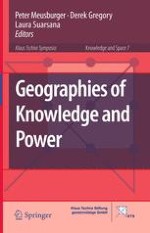2015 | OriginalPaper | Buchkapitel
15. Tau(gh)t Subjects: Geographies of Residential Schooling, Colonial Power, and the Failures of Resistance Theory
verfasst von : Sarah de Leeuw
Erschienen in: Geographies of Knowledge and Power
Verlag: Springer Netherlands
Aktivieren Sie unsere intelligente Suche, um passende Fachinhalte oder Patente zu finden.
Wählen Sie Textabschnitte aus um mit Künstlicher Intelligenz passenden Patente zu finden. powered by
Markieren Sie Textabschnitte, um KI-gestützt weitere passende Inhalte zu finden. powered by
